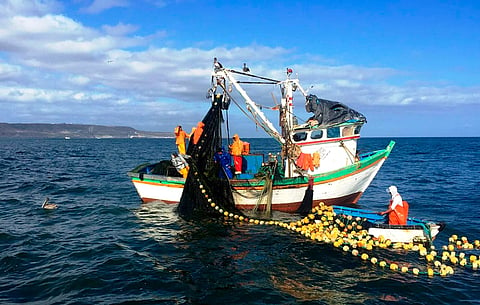

"The vessels joining today send a clear message: sustainability and science are not optional," said Peru's Vice Minister of Fisheries and Aquaculture.
Photo: Produce.
After the Peruvian Ministry of Production (Produce) authorized it last week, the 'Operation Giant Squid III' is currently underway in Peru. The novelty of this scientific operation is that artisanal fishing vessels committed to the sustainability of the jumbo flying squid have joined the political and scientific authorities to carry it out.
Led by the Peruvian Institute of the Sea (Imarpe), the scientific research will provide important information for the recovery and responsible management of the species in Peruvian waters after the El Niño 2023-2024. Abundance indicators, population structure, reproductive aspects, and oceanographic conditions will be evaluated under a strict scientific and sustainability approach.
Between August 1 and 10 the participating artisanal fishing vessels - which were selected following a transparent public call for proposals - are collecting essential technical information on the jumbo flying squid (Dosidicus gigas) - also known as Humboldt squid or giant squid - to support fisheries management measures and ensure its responsible exploitation.
Peru's Ministry of Production highlighted the active participation in the operation of several fishing organizations, whose owners show their willingness to work hand in hand with the Ministry and Imarpe.
Among them, Produce highlighted the fishing cooperative 'Jehová es Mi Pastor Nada Me Faltará' from La Tortuga, in the province of Paita; the Régimen 1392; or the Peruvian National Society of Artisanal Fishing (Sonapescal), which brings together 28% of the fishing vessels dedicated to the catch of jumbo flying squid and yellowtail kingfish in the country.
"The commitment of these vessels marks a before and after for the artisanal jumbo flying squid fishery. They not only support unprecedented scientific research but also demonstrate that it is possible to build a formal, orderly, and responsible fishing sector," said Jesús Barrientos, Vice Minister of Fisheries and Aquaculture.
"This operation demonstrates the commitment to the future of the fishery," he continued. "The vessels joining today send a clear message: sustainability and science are not optional, they are the basis for ensuring that jumbo flying squid remains a source of employment and well-being for thousands of families."
"Only by working in a coordinated manner will we be able to take care of the resource, preserve its productivity and, above all, generate confidence in fisheries management based on scientific evidence," Barrientos concluded.
Monitored and controlled by the Ministry of Production and the Peruvian Institute of the Sea, both will verify strict compliance with research and safety protocols during the development of the 'Operation Giant Squid III'. As mentioned above, the results obtained will serve as technical input to adopt measures to ensure a sustainable use of the resource, as well as the stability of the fishing activity.
The search for a balance between the economic needs of the fishery and its sustainability was precisely what led Produce to order the suspension of the jumbo flying squid fishery season on the last day of June. It had to be done after the total allowed catch (TAC) had been reached two months before its official expiration date, scheduled for August 31.
The jumbo flying squid fishery involves 4,475 artisanal vessels in Peru, generating direct employment for more than 14,000 fishermen and benefiting some 70,000 people in the country. Therefore, so far this year, the Peruvian government has not only approved a new Fisheries Management Regulation for the species last March, but just three months later, in June, further strengthened its protection by issuing new measures to manage this fishery with emphasis on fishing methods, control mechanisms, and operational practices on board.
